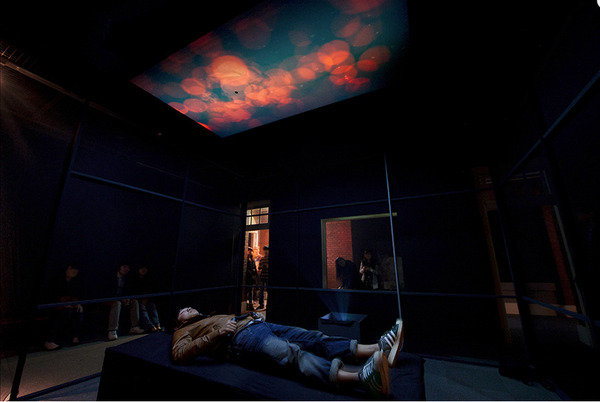Group Therapy
dal 4/3/2015 al 16/5/2015
Segnalato da
Katriona Beales
Kate Owens
Neeta Madahar
Quintan Ana Wikswo
Dora Garcia
Jennifer Kanary Nikolov(a)
George Khut
Melanie Manchot
Lauren Moffatt
Superflex
Ubermorgen
Erica Scourti
Vanessa Bartlett
Mike Stubbs
4/3/2015
Group Therapy
Foundation for Art and Creative Technology - FACT, Liverpool
Mental Distress in a Digital Age. The exhibition explores the complex relationship between technology, society, and mental health. It features works by artists, designers and researchers.

Group Therapy will feature works by artists, designers and researchers including new commissions from the vacuum cleaner, Katriona Beales and Kate Owens & Neeta Madahar. The exhibition will also feature work by Quintan Ana Wikswo, Dora García, Jennifer Kanary Nikolov(a), George Khut, Melanie Manchot, Lauren Moffatt, Superflex, Ubermorgen and Erica Scourti who has been working with FACT's young people's programme Freehand.
The exhibition Group Therapy: Mental Distress in a Digital Age will be showing at FACT (Foundation for Art and Creative Technology) between 5 March and 17 May. Originating from FACT's extensive work within mental health and wellbeing, the exhibition explores the complex relationship between technology, society, and mental health.
Works by artists, designers and researchers including new commissions from the vacuum cleaner, Katriona Beales, Kate Owens & Neeta Madahar and Quintan Ana Wikswo as well as restaged work from UBERMORGEN will encourage visitors to rethink their understanding of mental health and wellbeing, by asking how far our personal wellbeing is related to the values of the society we live in and the impact of new technologies.
Vanessa Bartlett, who is co-curating the exhibition with FACT's Director Mike Stubbs, says, "Group Therapy proposes that art and the creative use of digital devices can challenge dated ideas about mental illness, helping to reduce stigma and encourage open discussion about our personal wellbeing."
The exhibition design, created by researcher and PhD student at Royal College of Art Benjamin Koslowski, is carefully considered to evoke self-reflection and introspection by highlighting the threshold between the private, individual experience of the exhibition and the societal dynamics behind mental health issues.
Supported by the Wellcome Trust and the The British Psychological Society (BPS), the major new commission Madlove by the vacuum cleaner responds to the artist's own experience of psychiatric hospitals as punishing rather than loving environments. A collaboratively designed asylum will be created at FACT as "a safe place to go mad," appropriate for a society where all of us experience emotional distress. Madlove features advisors from across the health, higher education and science as well as design sectors, including principal partner the Institute of Psychology, Health and Society, University of Liverpool.
Group Therapy explores the past, present and future of mental health, and includes Superflex's video installation The Financial Crisis, which explores how modern economic systems have the capacity to leave us all feeling insecure and vulnerable.
The history of mental illness is highlighted from different perspectives. A photographic series of American asylum buildings by artist Quintan Ana Wikswo evokes the hyper-vigilant eye movements of post-traumatic stress disorder, offering viewers the opportunity to experience reality through the eyes of an individual marked as an outsider by the impacts of trauma or social injustice. By showcasing spaces formerly reserved for the mentally ill, she also provides insights into the historical context of mental illness and its surrounding power structures. Dora García's film The Deviant Majority features an interview with Carmen Roll formally of the German Socialist Patient's Collective (SPC) who in the 1970s argued that capitalism is responsible for manifestations of madness. An electroconvulsive therapy machine shows how technology is not a new concept in mental health settings.
Part of the exhibition is also an interactive archive showing 20 years of FACT projects for participants with mental health issues, in which artists have been working closely with the community in creative projects as well as created digital tools that support mental health. These projects have been organised in collaboration with various mental health organisations, including Mersey Care NHS Trust.
Image: George Khut (Australia), The Heart Library Project, 2007. Photos by Weng-Rong Chen ©2012 MOCA, Taipei.
Press contact:
Jen Chapman email: tel: 0151 7074404 jen.chapman@fact.co.uk
Opening 5 March / 6pm / FREE
FACT Foundation for Art and Creative Technology
88 Wood St Liverpool L1 4DQ UK
Gallery Times:
Tuesday - Sunday: 11am - 6pm
Admission:
Adult £10.00
FACT Member £8.00
Student/Retired £9.00 (£7.00 for Members)
Children £7.00
Family of 4 £30.00 (extra kids £7.50 each) includes drink & popcorn for each child)



